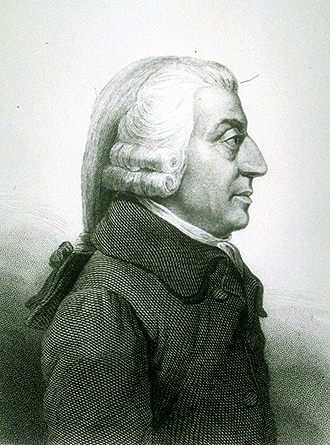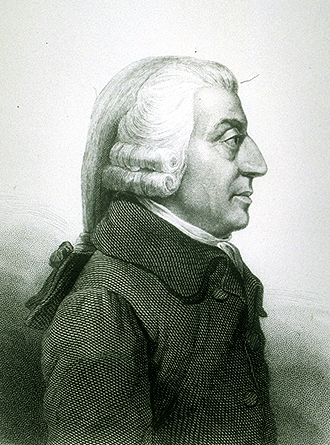Written by Kendal Hirschi
Adam Smith and Genetically Modified Foods

Adam Smith may be known as the father of capitalism but he was also a man profoundly interested in social justice. In “The Wealth of Nations” Smith’s most famous work showcased how commerce operates between individuals seeking to maximize their own returns.
In his less noted work “The Theory of Moral Sentiments”, he analyzed social interactions and how individuals aspire to help and support one another. Smith’s interest in social relationships trumped his interest in trade as he was constantly fine-tuning “The Theory of Moral Sentiments”, his first book, right up until his death – long after he had put “The Wealth of Nations” to bed. Here I argue that if Adam Smith was living today, he would endorse genetically modified foods to both improve commerce and provide social justice.
As described by historian Thomas J. Ward:
One could argue that Smith’s ultimate quest was social justice. He
Adam Smith’s Views on Religion and Social Justice
advocated an open market with economic and social protocols between countries that would result in an overall improvement in the living conditions of the common citizen. … Smith’s “invisible spectator’s” concern for the other, including the downtrodden of his society, are prerequisites to facilitate economic opportunities, greater social justice, and peace.
GMOs and Wealth
Within the ivory towers, today’s plant biologists are improving crop productivity for academic wealth: papers and research grants, the paucity of which is a subject for another time! Given current regulatory hurdles, the dream of bringing these crop improvements to the world’s poor is a fantasy. There is no mysterious “invisible hand” operating in the global market place to thwart the use of GMOs. It is a systematic campaign of misinformation by ill-informed, malicious groups. (GMO stands for Genetically Modified Organism. For more information, see Intro to GMOs by the SciMoms.)
When Smith referred to the “invisible hand” it was a metaphor for the motives that intentionally caused actions, which once taken, had unintended consequences. The ‘unmistakable hand” of the anti-GMO campaign has been to suppress the wealth of impoverished nations.
Agricultural development is a powerful tool to end poverty. Growth in the agriculture sector is two to four times more effective in raising incomes among the poor. If GMO crops are not utilized to save water, diminish fertilizer costs, and improve yield we have effectively limited the tools available to the world’s poor. Anti-GMO groups are handcuffing the world’s poorest people to their current plight.
GMOs and Moral Sentiment
Smith argues in “The Theory of Moral Sentiments” that our moral ideas and actions are the fabric of our social selves. He argues that our social behavior is a better guide to moral action than reason. Though scientists (and agbiotech) are self-interested, we have to work out how to live alongside others without doing each other harm.
The scientific consensus (and it is a consensus!) finds that GMO plants are safe and don’t seem to harm the environment. Hundreds of studies have been done (and millions of dollars spent) to show unequivocally that GMO plants are safe. Scientists are not creating GMO foods to harm consumers or the environment. Can the same be said for vocal groups that are anti-GMO?
The Bottom Line
Economic considerations of profitability, efficiency, and productivity are paramount for agriculture. If we forgo monetary gain to maintain specific environmental standards this would point to a moral agriculture viewpoint. Adam Smith would want us to take this moral perspective.
However, GMO foods do not require this choice to be made, as they are productive, efficient, and environmentally sound. By Smith’s standards, the anti-GMO rhetoric is difficult to defend because it does not support profit, efficiency, or most importantly, social justice.
Written by Guest Expert
 |
Kendal Hirschi works at the Children’s Nutrition Research Center at Baylor College of Medicine and is Associate Director of Research at the Vegetable and Fruit Improvement Center at Texas A&M. His research program centers on many biomedical issues and has published papers using bacteria, yeast, crops, zebrafish, mice, and human subjects. His research goal is to increase the nutritional content of crops, in collaboration with clinical faculty at Baylor College of Medicine. His long-term goal is to bridge the chasm between plant biology and nutritional sciences. |
Editors note: Thomas J. Ward quote added 3 February 2019 to provide a definition for social justice in the context of Adam Smith, which is different from the definition that might commonly be assumed in 2019.




